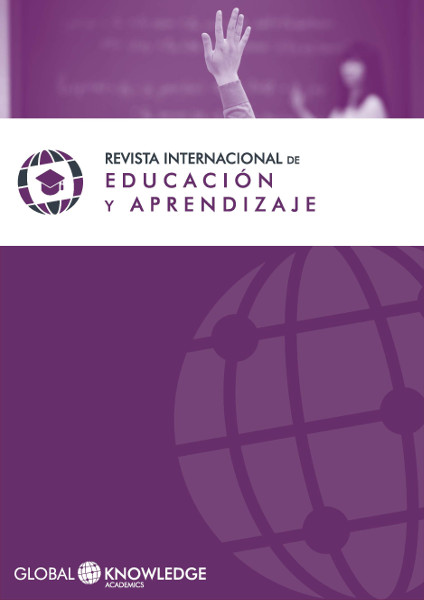Reading Training at University: A look at their integration in the curriculum
DOI:
https://doi.org/10.37467/gka-revedu.v5.1395Keywords:
Reading training, Curriculum, Learning in university, Higher education, Educational innovationAbstract
Reading contributes to meaningful and active learning, therefore it is essential support the reading development of students in order to possess the habilities and the motivation of this practice as a means of: inquire, learn, analyze and posit new knowledge. The following research aims to ascertain the contributing of the subject “Fomento a la Lectura”. The analysis launches from the theoretical principles of Pierre Bourdieu, lev Vygotsky and David Ausubel. A quiz was applied to the students and teachers were interviewed. The research insures that the curriculum planning should begin from the collaborative and academic work for students’ reading development.
Downloads
Global Statistics ℹ️
|
709
Views
|
195
Downloads
|
|
904
Total
|
|
References
Amavizca, S. (2009). La importancia de la lectoescritura en la formación de estudiantes universitarios y sus implicaciones pedagógicas: caso Unidad Académica. Hermosillo. México.
Araoz, E. et. al (2010). Estrategias para aprender a aprender. Reconstrucción del conocimiento a partir del aprendizaje. México: Pearson/Unison.
Arias, F. (2006). El proyecto de investigación científica: introducción a la metodología científica. Venezuela: Episteme.
Ausubel, D. (1991). Psicología educativa. México. Trillas
Baudelot, C., Cartier, M., & Détrez, C. (2010). Y sin embargo leen... Veracruz: Universidad Veracruzana.
Bourdieu, P. (1993). El sentido Práctico. Madrid: Taurus.
Bourdieu, P. (1997). Razones prácticas sobre la teoría de la acción. Barcelona: Anagrama.
Carlino, P. (2002). ¿Quién debe ocuparse de enseñar a leer y a escribir en la universidad? Tutorías, simulacros de examen y síntesis de clases en las humanidades. Lectura y vida, 6-14. Recuperado el 10 de septiembre de 2016 en: http://www.aacademica.org/paula.carlino/91
Carlino, P. ( 2013). Escribir, leer y aprender en la universidad. Buenos Aires, Argentina: Fondo de Cultura Económica de Argentina.
Cassany, D. Y. (2008). Leer y escribir en la universidad: Hacia la lectura y la escritura crítica de géneros científicos. Memoralia.
Cejas, M. (s.f.). La educación basada en competencias: una metodología que se impone en la Educación Superior y que busca estrechar la brecha existente entre el sector educativo y el productivo. Recuperado el 7 de julio de 2015, de http://juancarlos.webcindario.com/La_educacion_basada_en_competencias_Magda_Cejas_.pdf
Conaculta (2015). Encuesta Nacional de Lectura y Escritura 2015-2018. México: Conaculta.
Domingo. J. (2014). ¿Qué leen los que no leen?. México: Editorial Paidós.
Dubet, F. (2005). Los estudiantes. Revista de investigación educativa.
Garrido, F. (2004). El buen lector no nace, se hace. México: Ediciones del Sur.
Kingler, C. (1999). Psicología Cognitiva : estrategias en la práctica docente. México: Mc Graw Hill.
Petit, M. (2010). Leer & liar. Recuperado el 1 de marzo de 2016 en: http://literaturageneralppd.blogspot.mx/2010/06/leer-liar-michele-petit.html
Quintana, H. (2004). Comprensión lectora. Recuperado en enero de 2010 en http://www.univerxity.com/aspSmartUpload/21112004104030.doc
Subsecretaria de Educación Media Superior (2008). Recuperado el 7 de julio de 2015, de http://www.uv.mx/dgdaie/files/2013/09/competencias-genericas.pdf.
Teberosky, A., Guhrdia, J., & Escoriza, J. (1996). Las prácticas de lectura en estudiantes universitarios. Anuario de psicología, 85-107.
Vigotsky (1995). Pensamiento y lenguaje. España: Ediciones Paidós.
Downloads
Published
How to Cite
Issue
Section
License
Those authors who publish in this journal accept the following terms:
-
Authors retain copyright.
-
Authors transfer to the journal the right of first publication. The journal also owns the publishing rights.
-
All published contents are governed by an Attribution-NoDerivatives 4.0 International License.
Access the informative version and legal text of the license. By virtue of this, third parties are allowed to use what is published as long as they mention the authorship of the work and the first publication in this journal. If you transform the material, you may not distribute the modified work. -
Authors may make other independent and additional contractual arrangements for non-exclusive distribution of the version of the article published in this journal (e.g., inclusion in an institutional repository or publication in a book) as long as they clearly indicate that the work was first published in this journal.
- Authors are allowed and recommended to publish their work on the Internet (for example on institutional and personal websites), following the publication of, and referencing the journal, as this could lead to constructive exchanges and a more extensive and quick circulation of published works (see The Effect of Open Access).













